
I learned to love river waters when crossing bridges in old Fords with "nose-to-the-glass" anticipation.
I discovered their history page by page with Lewis and Clark.
I learned to predict what lies ahead by reading them from the stern of a canoe.

I was taught by them -guided by Hereclitus;
“You can never step into the same river twice; for new waters are always flowing on to you.”(Greek philosopher remembered for his cosmology, 540-480BC)
Then I found where all my rivers went.

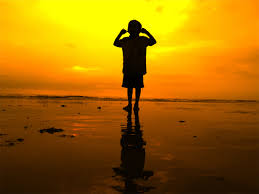
Oh Ocean, she was so scary at first-
she was beyond power, beyond mystery,
she was completely unfathomable from shore.

Books and television unlocked land-locked eyes and ears and imagination... and Cousteau became a Hero.
"Call me Ishmael?" - a good start but, ... how many pages???
10,000 Leagues Under the Sea- walking on the bottom?
Flipper? Really?... Lassie with fins?
What about" The Professor and Mary Ann?" I mean, why would they even want to leave?

And of course, Sea Hunt! (OMG if Lloyd Bridges wasn't truly, secretly, really Aquaman then who was? )
Once I stepped into her surf, I never stepped out. I've been north and south and to the other side of the wo
 rld, she is always there- waiting .
rld, she is always there- waiting .I have shared (some of) her secrets with others, sung her beauty to loved ones, splashed her laughs with children, and been uplifted by her buoyant, boundless promise in the simple solitude of a sunset swim.

The List of Will We Never Learn?
1) Arabian Gulf Spills
Note: This is currently the world's largest and the oil spill took place during the Gulf War when Iraqi forces deliberately destroyed oil tankers, wells and terminals.
• Location: Persian Gulf
• Year: 1991
• Amount of Oil Spilled in Gallons and Liters: 520 million gallons (1.9 billion liters)
2) Ixtoc I Oil Well
• Location: Gulf of Mexico
• Year: 1979
• Amount of Oil Spilled in Gallons and Liters: 140 million gallons (530 million liters)
NOTE: It took nearly 10 months for the responders to stop the oil from flowing in the IXTOC 1 accident. And this was a well that was in only about 164 feet of water. That allowed divers to be sent down to cap the well The Deep water Horizon is in 5000 feet of water
3) Atlantic Empress
• Location: Trinidad and Tobago
• Year: 1979
• Amount of Oil Spilled in Gallons and Liters: 90 million gallons (340 million liters)
4) Fergana Valley
• Location: Uzbekistan
• Year: 1992
• Amount of Oil Spilled in Gallons and Liters: 88 million gallons (333 million liters)
5) ABT Summer
• Location: 700 nautical miles from Angola (3,900 km)
• Year: 1991
• Amount of Oil Spilled in Gallons and Liters: 82 million gallons (310 million liters)
6) Nowruz Field Platform
• Location: Persian Gulf
• Year: 1983
• Amount of Oil Spilled in Gallons and Liters: 80 million gallons (303 million liters)
7) Castillo de Bellver
• Location: Saldanha Bay, South Africa
• Year: 1983
• Amount of Oil Spilled in Gallons and Liters: 79 million gallons (300 million liters)
8) Amoco Cadiz
• Location: Brittany, France
• Year: 1978
• Amount of Oil Spilled in Gallons and Liters: 69 million gallons (261 million liters)
9) MT Haven
• Location: Mediterranean Sea near Italy
• Year: 1991
• Amount of Oil Spilled in Gallons and Liters: 45 million gallons (170 million liters)
10) Odyssey
• Location: 700 nautical miles (3,900 km) off of Nova Scotia, Canada
• Year: 1988
• Amount of Oil Spilled in Gallons and Liters: 42 million gallons (159 million liters)
11) Sea Star
• Location: Gulf of Oman
• Year: 1972
• Amount of Oil Spilled in Gallons and Liters: 37 million gallons (140 million liters)
12) Morris J. Berman
• Location: Puerto Rico
• Year: 1994
• Amount of Oil Spilled in Gallons and Liters: 34 million gallons (129 million liters)
13) Irenes Serenade
• Location: Navarino Bay, Greece
• Year: 1980
• Amount of Oil Spilled in Gallons and Liters: 32 million gallons (121 million liters)
14) Urquiola
• Location: A Coruña, Spain
• Year: 1976
• Amount of Oil Spilled in Gallons and Liters: 32 million gallons (121 million liters)
15) Torrey Canyon
• Location: Isles of Scilly, United Kingdom
• Year: 1967
• Amount of Oil Spilled in Gallons and Liters: 31 million gallons (117 million liters)
The Exxon-Valdez oil spill in 1989 was the largest spill in United States history. It occurred in Prince William Sound, Alaska and spilled around 10.8 million gallons (40.8 million liters) and impacted 1,100 miles (1,609 km) of coast.
It isn't just the SIZE of the spill, but the NUMBER of spills Click on NOAA' s Incedent News and you just might be shocked.
And now, once again,
How dare they!
My Ocean belongs at once to no one and to everyone.
How dare anyone, anywhere, at anytime for any reason threaten, harm, despoil, and foul her, for the ocean is the source of life- your life, our life, all life .... my life.
I am angry. I cry.
How dare they.
 Deepwater Horizon Response Website
Deepwater Horizon Response Website( Deepwater Horizon before sinking)
Less than a year before the Deep Horizon, July 21, 2009 in the Gulf 20 miles off the Mexican Coast... " At least 18 oil workers were killed when a drilling rig hit an oil platform in stormy weather, spilling gas and oil into the Gulf of Mexico, the state-owned oil company Pemex said. Seven workers were still missing." (below left)
And as mentioned in an earlier MRV BEACH TEACH BLOG "SLICK OIL" the North Australian oil spill of last summer; "Conservationists warned yesterday that one of Australia's worst off-shore oil spills was killing wildlife and "massively contaminating" one of the world's last great wildnernesses. Amid a fourth attempt to plug the 64-day-old leak at the Montara drilling rig, the slick – which has already spread over an area 10 times the size of London – continued to expand..." (below right)

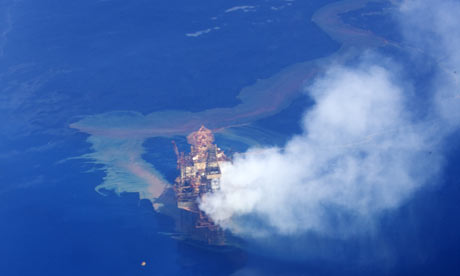
From The Huffington Post
James Moore
May 3rd, 2010
We might be powerless.
The oil flowing out from the seabed in the Gulf of Mexico may be under such great pressure that we do not possess technology to stop the tragedy. Chances are quite good we have no true sense of the dire nature of the situation. The facts that have been ascertained, however, lead to a dark scenario.

We know that the blowout preventers did not work but we do not know why. There are theories, though. The Deepwater Horizon rig was floating on pontoons about 5000 feet above the floor of the Gulf. When drillers struck an oil deposit, the bit was reported to be at about 18,000 feet, which is approximately three and a half miles beneath the platform. Does science even know what kind of pressure can be encountered at that depth, under almost a mile of water and two and half miles of rock?

BP and Transocean, which owns the rig, has said there was a maximum working pressure of 20,000 PSI but the system was able to handle a kickback pressure from gasses of about 60,000 PSI. The breakdown of the blowout preventers can be interpreted to mean the pressure coming up from the hole exceeded 60,000 PSI. Generally, various mixtures of mud circulate up and down the drill pipe to act as lubricants and equalize pressures encountered at great depth, and this process was said to be working at the time of the accident. Does this mean it's possible, even likely, that the Deepwater Horizon encountered pressures current technologies are not equipped to handle?
Although BP and Washington are trying very hard to convince the public that everything possible is being done to stem the flow of crude, there is seemingly little that might be accomplished. 5000 feet below the surface of the water with oil blasting out at tens of thousands of PSI, and wreckage from the giant rig scattered about, fixes are not easy to find. The latest plan is for a special funnel to be placed over the spout, which will then force the flow into a pumping channel. But how does a funnel get placed over the top of anything pushing at that kind of pressure? Consider that story to be an unrealistic solution.
A well blowout in 1979 offers a bit of context; except the Deepwater Horizon horror show is already about to transcend what happened in the Bay of Campeche off the coast of Mexico. The Ixtoc 1 rig blew an
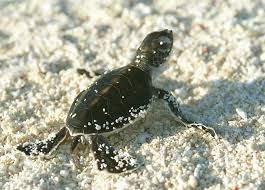 d began to spew crude that flowed uninterrupted for nine months.
d began to spew crude that flowed uninterrupted for nine months.Before the well was capped, 3,000,000 barrels of crude had drifted north to Texas and the northern coast of Mexico. The endangered Kemps-Ridley turtle, which nests along the border beaches, had to be airlifted to safety and has only begun in recent years to recover in population.
The Ixtoc disaster, however, is a spit in the ocean compared to the British Petroleum apocalypse. Estimates are the current blowout is putting 200,000 gallons or 5000 barrels of crude per day into the waters of the Gulf. Ixtoc's blowout was not capped until two relief wells we
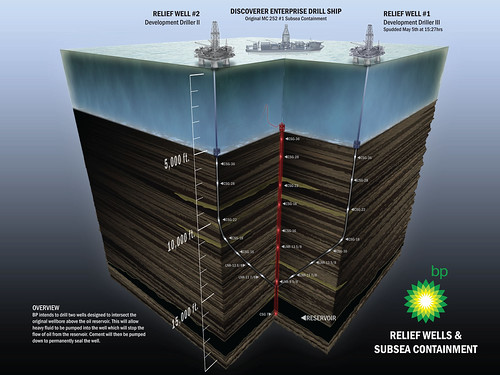 re drilled and completed at the end of those nine months, and regardless of optimistic scenarios from the federal government or BP, relieving the pressure on the current flow is probably the only way to stop the polluting release of oil. The only way to relieve that pressure is with additional wells. No one is going to honestly say how much time is needed to drill such wells but consider the scope of environmental damage we are confronting if it requires at least as long as Ixtoc. Nine months of 5000 barrels of crude per day ought to turn the Gulf of Mexico into a lifeless spill pond and set toxins on currents that will carry them to deadly business around the globe.
re drilled and completed at the end of those nine months, and regardless of optimistic scenarios from the federal government or BP, relieving the pressure on the current flow is probably the only way to stop the polluting release of oil. The only way to relieve that pressure is with additional wells. No one is going to honestly say how much time is needed to drill such wells but consider the scope of environmental damage we are confronting if it requires at least as long as Ixtoc. Nine months of 5000 barrels of crude per day ought to turn the Gulf of Mexico into a lifeless spill pond and set toxins on currents that will carry them to deadly business around the globe.NOAA apparently believes the situation is on the verge of getting worse. A leaked memo suggests that the tangle of pipes on the ocean floor are covering and constraining two other release points. Pressure is likely to blow those loose and, according to NOAA, the gusher will increase by "orders of magnitude." In most interpretations, that phrase means a ten-fold rise in the flow, which will replicate the Ixtoc disaster in three days.
And there are no guarantees relief wells are the fix. That is a complicated project. They are drilled to intersect the main well and then concrete is forced down the holes to seal the leaking well. What do we do, if that doesn't work? Humans cannot function at 5000 feet of ocean depth and the mitigation efforts currently are being handled by robotic remotes. What is left to us as a solution other than an explosive device, which is often what is deployed during above ground blowouts? Given the pressures reported and the amount of flow, we may need a bunker-buster nuke to be placed over the wellhead. We can then begin to talk about the water pressures caused by burst at detonation and residual radiation. Is that a better or worse situation? Certainly, aquatic life in the Gulf of Mexico is doomed unless there is a reclusive genius to step forward and save us from our great failure.

The attorney general of Texas, Greg Abbot, informed reporters that it appears Texas will escape harm. Abbot's visionary powers must exceed his legal skills since there is no way to know when and even if the well will ever be capped. In fact, if there is no plug placed in the hole, it is not inconceivable that no part of the planet's oceans will escape harm. According to the non-profit, non-partisan Air and Waste Management Association, a quart of crude oil will make 150,000 gallons of water toxic to aquatic life. BP, which has been marketing itself as an energy company "beyond petroleum," is setting loose upon the planet what is quickly turning into humankind's worst environmental disaster.
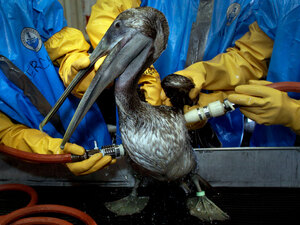
Tone-deaf politicians, especially from Texas, are trying to manage public fears, which is exactly what the state's former governor attempted in 1979. Bill Clements, who was one of the founders of SEDCO and owned the Ixtoc platform, originally described concerns as "much ado about nothing." As oil moved toward the pristine beaches of the Padre Island National Seashore, his advice was to "pray for a hurricane." I confronted Clements on his lack of concern and he stuck his finger in my chest and told me the state was not hurt. Thirty years later the tar balls still roll in with shifts of tide and wind and oil was everywhere on the beach for years.
Anyone who thinks this tragedy is not going to result in massive kills of marine life is either blind, ignorant, or in denial. The one scenario that we all refuse to confront is the possibility that it is beyond our capabilities to stop this undersea blast of oil. If that is the case, the flow continues until the pressure eases, which might be years. How much ecological injury will that cause our planet?
Nobody knows.
Comments are very welcome please post in the comments box. Maybe you have a solution.

Thank you. I too feel that my cries fall on deaf ears. I am sick with the realization I am literally watching them destroy an ocean. I saw a commercial for BP 15+ years ago where they gloated on their ability to drill in the sea safely. I swore then I would never use their gas and have kept that promise for more than half my life.
ReplyDeleteThank you for your time and energy.
I feel some how we need to get attention on all other rigs at least here in the US. I fear most have dismal maintenance records. It is conceivable that others could fail the same in the days ahead. Who out there are asking for their accountability?
Excellent work! Thank you for this information, which does not seem to be coming through many other channels. We are concerned.
ReplyDeleteThese disasters were predicted by some very intelligent scientists in the late 80's, whose messages when disregarded by politicians being greased by deep pockets of oil companies. Thanks for the oratory!
ReplyDeleteDick Hellwege
I am honored that you have left a comment.
ReplyDeleteIt is frustrating when science doesn't have all the answers.
BUT IT IS BEYOND FRUSTRATION when science DOES HAVE ANSWERS and is ignored for greed!
YOU might get away with breaking the society's laws ... but not Nature's.
THANKS Mr Hellwege
I've done the math, and approximately 79,380,000 gallons of Louisiana sweet crude (and counting) have gushed into the Gulf of Mexico since April 20, 2010.
ReplyDeleteIf BP were forced out of that location once the spill was stopped then I bet they'd have a quick solution/fix.
ReplyDeleteHowever, I believe that they (all who profit from this location) are trying to retain their find to make the almighty dollar and in doing so, it is restricting their efforts to kill the spill.
This a a devasting situation and it is so sad to see the greed of the powers at play. Thank you for your in depth information.
ReplyDeleteLinda
I found this information very helpful. So i was watching the news the other and I herd they were talking about the oil spill (big suprise right) so I just sat down and listened. I was just choline out and watching it and I noticed that they were talking about hair salons and how they are cutting peoples hair and putting it in littlt net then they would use it to sole up the oil in the oil spill. I herd this when I remembered a lab I had done in mr.v's class. I remembered thatwhen me and my partner caroline tried to clean the oil up the feather unbsorbed the most oil and I think that hair does the same job. I do not think this will handle all the oil but if we all work together I think we can make a difference!
ReplyDeleteHannah, I'm so GLAD you made the connection between our lab and what is really happening. It is interesting that natural materials (hair, feathers, hay and grass) clean up oil so much better that man-made materials
ReplyDeleteMaybe the people in charge will notice the connection too! (of course they probably didn't have me for a Science teacher.)
Thanks HAnnah
2 points in the bonus box for you.
Thank you for commenting Linda.. it is appreciated.
ReplyDeleteWhen I first heard about the oil spills I was devasted. My family basically depends on toursim to live. So, if the oil comes our way than we have no business. They run a charter boat business. So I'm hoping that the oil does not come our way. But than I relize that hoping doesnt always work, and most likely that it will come into our area. So I understand how you feel.
ReplyDeletePaige I appreciate your comment and sharing your concerns. Working together and for the good of all, which means understanding and working WITH nature not against, we will all weather the coming storm.
ReplyDeleteThank you
I am just hoping that at least a little shred of good will come out of this unbelievably horrendous mess. No more off-shore drilling! We need to put our collective foot down! Have people forgotten that we only get one earth?? You can have all the money in the world, but you can't buy mother nature. I hope our politicians are paying attention and learning from this (though from the research on this page, I doubt that is happening). Keep up the good work Mr. V and the Mad Beach Manatees! I agree with Kacy, "Go tell it on the mountain!"
ReplyDeleteThank you so much Ms Jones... by the way there is room up here for you to shout along with me ya know.
ReplyDeleteWrite your congressman.
thanks
MR V
I was watching fox news channel and I was looking at the map for the weather and all the sudden I saw this big black spot right in the gulf of Mexico. I took a moment to think, I thought about how that is is all our doing and I was stunned, I realized it is my doing too I mean my parents got gass from bp for the longest time. My mom also told me that the other day that well the garbage that they were trying to block the oil from comming out well that has failed allready(big suprise). So now I guess I will just have to look forward to a beach free summer yay!
ReplyDeletewow that is a lot of oil spills i never knew there had been so many!!!
ReplyDeleteP.S.(OMG if Lloyd Bridges wasn't truly, secretly, really Aquaman then who was? )um random?
This comment has been removed by the author.
ReplyDeleteHannah, I don't think we will be hit very hard unless a big storm blows in from the west-
ReplyDelete( hurricane ?)there is a shallow "shelf" that will keep a lot of it off shore of west Florida.
However other places will certainly see oil, and tar balls .
( 2pts in the bonus box )
Taylor..."um random" ??
My mom told me the other day when she was watching the news and she her that there were a couple people doing an experiment (me and my mom talk about this sort of stuff a lot) so they put ocean water from the gulf of Mexico and they mixed it in with a little but of oil. They found out that it raised the tempurature of the water so if we do have a hurricane it might get a little bit nasty.
ReplyDeleteP.s : speaking of nasty I was eating lunch in the courtyard and a racoon almost pooped on me yuck!
Okay Hannah, That's a WINNER.
ReplyDelete5 bonus points in the bonus box for you!!
So I jut was watching fox like 2 min ago but this time not only did I see people just talking about it but I saw what the oil spill was affecting and how it was affecting what it was affecting. In this case it was affecting pelicons. Know when I say this make sure you understand that I am not one of those people that care for animals more than I do other humans . But when I see the birds and how they are struggling and there is no one to help them, and after that I realize that we who are privlidged so much as to live on this buetiful earth just pollute it and we have an option I mean you would think that if you were drilling that far down and you know that your gonna go bankrupt and so many other things happen you would take percotions , it just all kind of makes me mad. But I do have a question (the answer is not 37) I know that you think all of the things that they are trying to make stop the leek are going to fail and you think in the end they are gonna explode it But I am curious as to how that would work wouldn't the rest of the oil come out during that explotion? (just curious)
ReplyDeleteWow Hannah, once again I am impressed with your thinking.
ReplyDeleteCheck out this video..
http://www.youtube.com/user/RussiaToday
It will help BEGIN to answer your question.